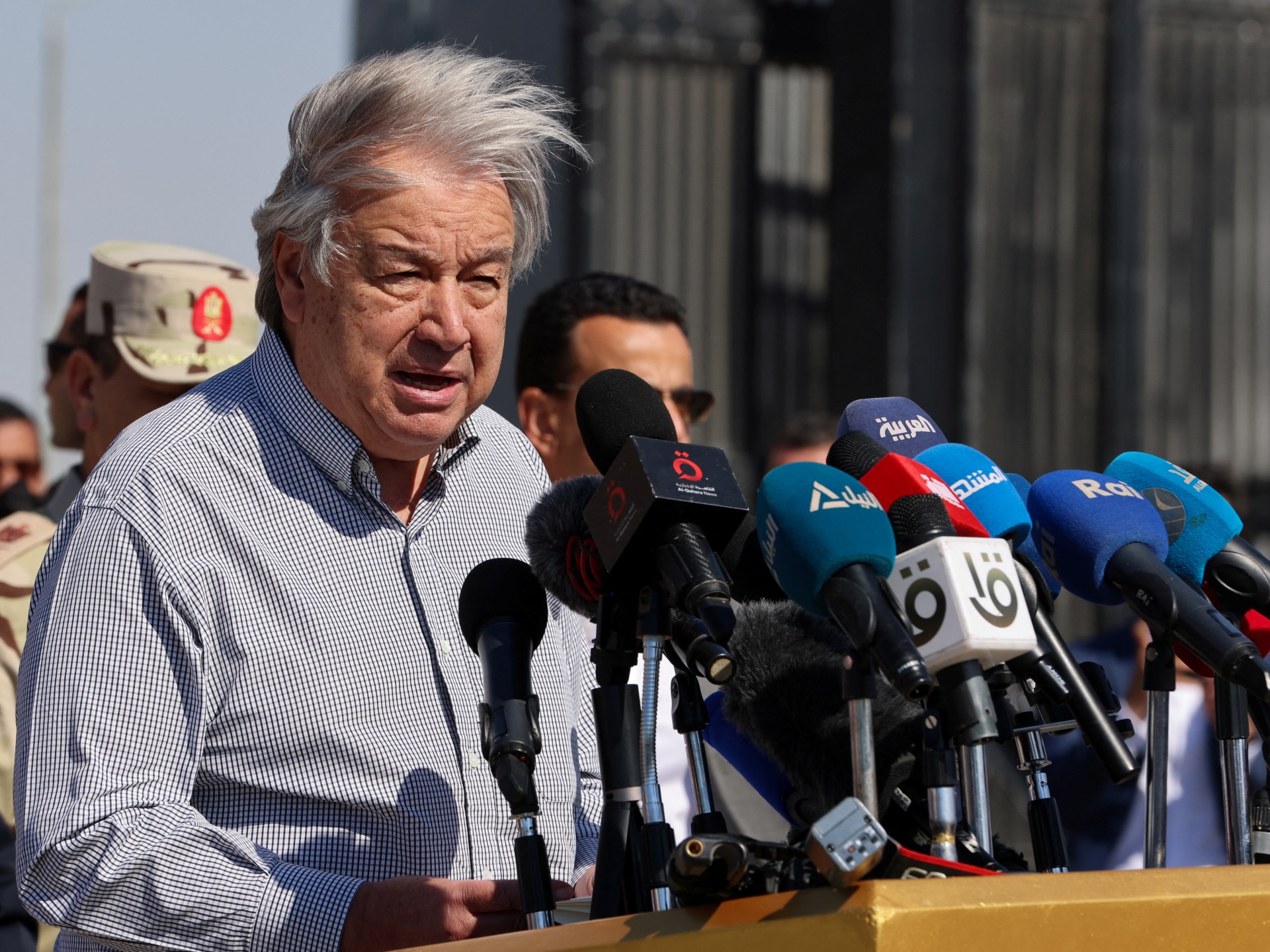The line of blocked aid trucks stuck on Egypt’s side of the border with the Gaza Strip while Palestinians face starvation on the other side is a “moral outrage”, United Nations Secretary-General Antonio Guterres said on a visit to the Rafah crossing.
“I have come to Rafah to shine a spotlight on the pain of Palestinians in Gaza,” the UN chief said on Saturday, addressing a news conference in El Arish, in Egypt’s northern Sinai, where much of the international relief for Gaza is stockpiled as Israel continues to block aid from entering.
“Here, from this crossing, we see the heartbreak and heartlessness of it all. A long line of blocked relief trucks on one side of the gates, the long shadow of starvation on the other,” he said.
“That is more than tragic. It is a moral outrage. Any further onslaught will make things even worse – worse for Palestinian civilians, worse for hostages and worse for all people in the region.”
The visit by Guterres, which is a part of his annual “solidarity trip” to Muslim countries during Ramadan, comes as Israel faces global pressure to allow more humanitarian aid into Gaza, which has been devastated by more than five months of war.
“You cannot see so many people being killed, you cannot see so much suffering without feeling hugely frustrated,” Guterres said while taking questions from reporters. “We don’t have the power to stop [the war in Gaza], I appeal to those who have the power to stop it to do it,” he added.
Every year, I undertake a solidarity mission during the holy month of Ramadan, a time for spreading compassion, community & peace.
This year, I have come to the Rafah crossing to spotlight the hardship and pain of Palestinians in Gaza – and the obstacles to easing their plight. pic.twitter.com/EJmtL966O4
— António Guterres (@antonioguterres) March 23, 2024
‘Flood Gaza with life-saving aid’
Several NGOs and rights organisation have accused Israel of deliberately blocking aid to Gaza as warnings of famine in the besieged strip rise.
Receiving Guterres at the airport in El Arish, regional governor Mohamed Shusha said some 7,000 trucks were waiting in North Sinai to deliver aid to Gaza, but that inspection procedures demanded by Israel had held up the flow of relief.
The UN chief stressed that it was time for Israel to give an “ironclad commitment” for unfettered access to humanitarian goods throughout Gaza and said that the UN would also continue to work with Egypt to “streamline” the flow of aid into Gaza.
“It’s time to truly flood Gaza with life-saving aid. The choice is clear: either surge or starvation,” Guterres said.
This week, a global food monitor warned that famine was imminent in northern Gaza and could spread to other parts of the territory if a ceasefire is not agreed.
In a post on the social media platform X, Philippe Lazzarini, the head of the UN Relief and Works Agency for Palestine Refugees (UNRWA), said a food convoy had been denied access to northern Gaza for the second time this week.
Lazzarini noted the last time the UNRWA was able to deliver aid to the northern part of the enclave, where starvation is spreading, was two months ago.
“This is a man-made hunger & looming famine which can still be averted,” he said. “The Israeli authorities must allow delivering food aid at scale to the north including via UNRWA, the largest humanitarian organisation in Gaza.”
Israel has kept all but one of its land crossings into the enclave closed. It opened the Karem Abu Salem crossing (which Israel calls Kerem Shalom) close to Rafah in late December and denies accusations by Egypt, rights groups and UN agencies that it has delayed deliveries of humanitarian relief.
‘Aid distribution with a humanitarian ceasefire’
Since October, more than 32,000 Palestinians have been killed by Israel’s military campaign in Gaza, most of them women and children, according to local health authorities.
Guterres highlighted that the continuing war has become an obstacle for delivering aid in the region with continuous violence and bombardments killing people and humanitarian workers at aid distribution points.
On Saturday, shortly before Guterres’s news conference, at least seven people were killed in Israeli shelling as aid was being distributed at the Kuwait Roundabout in Gaza City, Al Jazeera correspondents reported.
This attack at a food distribution point, a primary location for delivering assistance to the northern part of the strip, comes days after at least 21 Palestinian people were killed by Israeli troops in Gaza City, while waiting for aid.
“There is no way to have an effective aid distribution in Gaza without a humanitarian ceasefire,” the UN chief told reporters, adding that it was also time for all captives being held by Hamas in Gaza to be released.
Check out our Latest News and Follow us at Facebook
Original Source

